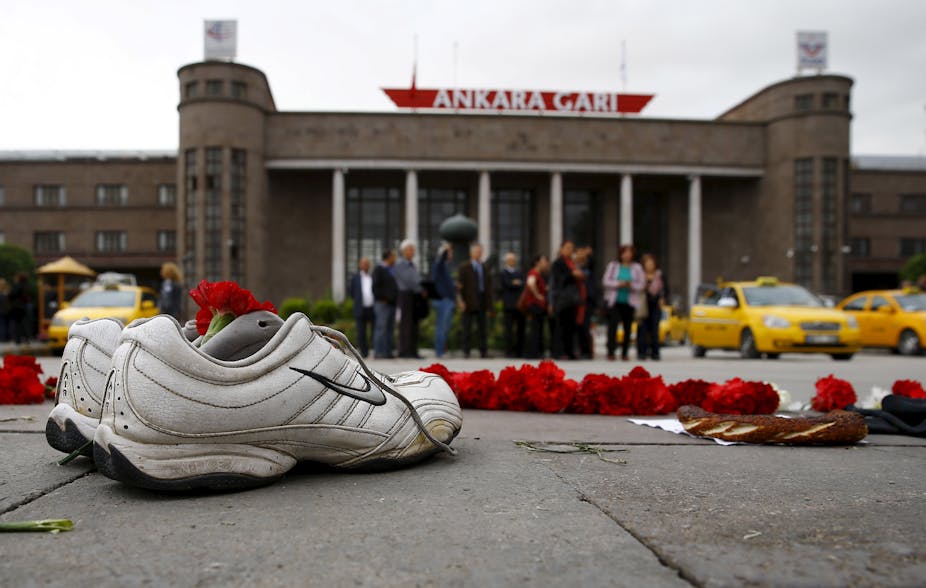Turkey is reeling from the worst terrorist attack in its history – the twin bombings in Ankara on October 10 that claimed the lives of up to 128 people attending a peace rally. Much rests on the investigation into who carried out what appears to have been a suicide attack.
While the government has named Islamic State as one of the main suspects, some activists have suggested that Turkey’s deep state could be involved. This has stirred up decades-old wounds.
The victims of the Ankara attack were largely supporters of the Kurdish oriented and liberal-left People’s Democratic Party (HDP). They had gathered in the capital to march for peace ahead of a national election on November 1.
Those who think IS sent two suicide bombers to the scene suggest the terrorist group was seeking to punish the Kurds for fighting alongside their brethren in Syria. Indeed, this would not be the first time IS has attacked the Kurds.
But the HDP leader, Selahattin Dermirtas, has also accused the Turkish government of having blood on its hands after the Ankara bombings. He says the government did not properly investigate previous IS attacks on the HDP either.

Similar sentiments have been expressed on social media and by attendees at anti-government protests. Why, some people are asking, does the HDP get attacked and not the hundreds of other public rallies organised by other parties? Has there been state collusion in any of the attacks, or at best negligence on the part of the security and intelligence services?
A secret network
These questions have naturally led to discussions about Turkey’s so-called deep state – a term that may sound alien to western observers.
The deep state (in Turkish, derin devlet) is best understood as ultra-nationalist networks that consisted of the state’s military and security apparatus as well as members of civil society. These networks were supposedly formed during the Cold War to fight subversive communist agitators within Turkey. However, they were also thought to have been used against the Kurdish insurgency that gripped the south-east of Turkey during the 1980s and 1990s.
The secretive and clandestine nature of these deep state networks allowed the Turkish government to insist that it had no knowledge of them. It was able to deny involvement in some of the more violent episodes of the counter-insurgency campaign carried out against the outlawed Kurdistan Workers Party (PKK) as it fought for autonomy in the 1980s and 1990s.
Meanwhile, it was believed that the networks were deploying special squads to assassinate leading Kurds. These squads were organised into cell-like structures and believed to be answerable to the military, which would recruit underworld figures from organised crime, the police or the security services who would launch operations in an apparently autonomous manner. No one would know who had carried out an attack or who ordered it.

Turks were given a glimpse of the inner workings of the deep state after a November 1996 car crash near the town of Susurluk. Three of the four passengers inside the car were killed. What was strange about the incident was the group of people found inside the car. In the wreckage was found a senior police official, a former leader from the Grey Wolves ultra-nationalist paramilitary group (who was also a wanted murderer and drug trafficker) and his girlfriend, a former beauty-queen-turned-hit-woman.
The sole survivor of the crash was none other than a Kurdish warlord from a large state-supported anti-PKK village guard. The question on everyone’s lips was, no doubt: “What were these people doing together?” The incident became a public scandal. For many Turks this was evidence of the existence of a deep state.
The spectre of the deep state was raised again following the Ergenekon investigations from 2008 and the Balyoz trial in 2010. Alleging a military-led deep state coup against the Justice and Development Party (AKP) government for its Islamic sympathies, these cases saw hundreds of people accused of plotting bomb attacks and civil unrest to ease the passage for a military takeover – although the military denied any involvement in a plan to overthrow the government and convictions have since been overturned.
Despite these trials, it is actually more likely that Turkey’s deep state apparatus was either dissolved or became inactive after the Susurluk scandal. The Kurdish insurgency had, after all, come to a medium-term halt following the capture of PKK leader Abdullah Ocalan in 1999.
The scars from that period have not gone away though. There remains a lack of clarity about what the deep state was, how it operated and justice for its victims which has, in turn, lead to a general lack of public trust, not least from Turkey’s 12m-15m strong Kurdish minority.
A rapid and thorough investigation into the Ankara bombings would do much to alleviate such anxiety and any further allusions to the involvement of the Turkish deep state. It would also reassure the public that such conspiracies remain a thing of the past.

